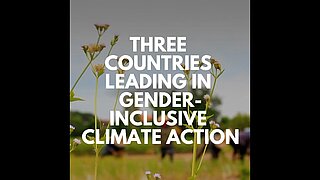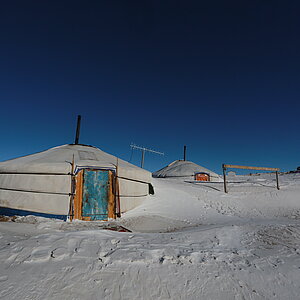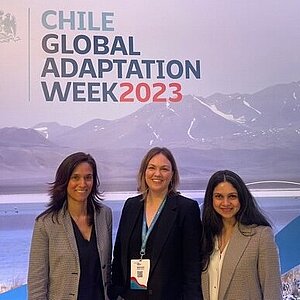Support programme on scaling up climate ambition on land use and agriculture through NDCs and National Adaptation Plans (SCALA)
With climate change threatening the agriculture sectors, livelihoods and food security, there is an urgent need for scaled action to cope with climate-related impacts. In response to that, SCALA supports 12 countries in Africa, Asia and Latin America to both build adaptive capacity and to implement low emission priorities in agriculture and land use. The programme uses a multi-stakeholder approach, harnessing strong engagement from the private sector and key national institutions. National activities focus on strengthening policies, appraising and adopting innovative approaches, as well as removing key barriers related to information gaps, governance, finance, gender mainstreaming and integrated monitoring and reporting. The ultimate goal is for countries to turn agricultural related priorities laid out in their National Adaptation Plans (NAPs) and Nationally Determined Contributions (NDCs) into action.
- Countries
- Argentina, Cambodia, Colombia, Costa Rica, Ivory Coast, Egypt, Ethiopia, Mongolia, Nepal, Senegal, Thailand, Uganda
- IKI funding
- 26,000,000.00 €
- Duration
- 11/2019 till 12/2028
- Status
- open
- Implementing organisation
- United Nations Development Programme (UNDP)
- Political Partner
-
- Ministries of Agriculture and Rural Equipement - Senegal
- Ministries of Food, Agriculture and Light Industry - Mongolia
- Ministry for Environment and Sustainable Development (MEDD) - Senegal
- Ministry of Agriculture, Animal Industry and Fisheries - Uganda
- Ministry of Agriculture, Forestry and Fisheries - Cambodia
- Ministry of Agriculture, Livestock and Fisheries (MAGyP) - Argentina
- Ministry of Agriculture & Land Reclamation - Egypt
- Ministry of Agriculture and Cooperatives - Thailand
- Ministry of Agriculture and Livestock - Costa Rica
- Ministry of Agriculture and Livestock Development - Nepal
- Ministry of Agriculture and Natural Resources - Ethiopia
- Ministry of Agriculture and Rural Development - Colombia
- Ministry of Agriculture and Rural Development - Cote d 'Ivoire
- Ministry of Environment, Forest and Climate Change (MEFCC) – Ethiopia*
- Ministry of Environment (MoE) - Cambodia
- Ministry of Environment and Energy (MINAE) - Costa Rica
- Ministry of Environment and Sustainable Development (MinAmbiente) - Colombia
- Ministry of Environment and Sustainable Development - Argentina*
- Ministry of Environment and Sustainable Development - Côte d’Ivoire
- Ministry of Environment and Tourism – Mongolia; Ministry of Environment MoE - Egypt; Ministry of Forests and Environment - Nepal; Ministry of Water and Environment - Uganda; Office of Natural Resources and Environmental Policy and Planning - ONEP - Thailand; Secretariat of Agriculture, Livestock and Fisheries - Argentina; Undersecretariat of Environment and Sustainable Development - Argentina
- Implementing Partner
-
- Food and Agriculture Organization of the United Nations (FAO)
State of implementation/results
- Outcome 1: Strengthening the evidence base for transformative climate action:
- SCALA supports countries in identifying and prioritising options for transformative climate action in national plans and in strengthening capacities for evidence-based decision-making. All countries are conducting Systemic Landscape Assessments (SLAs) to close information gaps for implementing climate priorities in the agriculture sector and to mobilise finance. Examples include:
- Cambodia: In collaboration with the Royal University of Agriculture (RUA), SCALA developed strategies to strengthen the resilience of smallholders and communities through more sustainable livestock farming. In addition, deforestation-related products such as cashew and cassava were identified in Steung Treng Province, and measures for gender-responsive, climate-resilient, and profitable value chains were proposed.
- Côte d’Ivoire: Identified gender-responsive, climate-resilient practices for sustainable cashew and cassava value chains, assessed their profitability, and highlighted private sector investment potentials.
- Mongolia: Improved climate resilience of local communities by evaluating the potential of surface water collection facilities, with a focus on livestock and crop farming.
- Egypt: The impact of climate change on the economy and women-headed households led to identified measures to address gender-specific climate risks.
- SCALA strengthens governance mechanisms by promoting stakeholder participation and empowering the institutions responsible for implementing Nationally Determined Contributions (NDCs) and National Adaptation Plans (NAPs) to mainstream agriculture and land-use priorities into planning, budgeting, monitoring, and reporting. Examples include:
- Integration into national plans:
- Nepal: Integration of climate issues into the Agriculture Development Strategy (ADS).
- Thailand: Progress-tracking framework for the Climate and Agriculture Action Plan (2023–2027).
- Egypt, Thailand, Uganda: Promoting policy coherence between food systems and climate action.
- Capacity Development:
- Trainings for local government planners on NDC and NAP integration (Ethiopia).
- Trainings on gender-responsive climate budgeting (Mongolia).
- Capacity-building package for climate-resilient agriculture (Nepal).
- Monitoring & Evaluation (M&E):
- Trainings on M&E and MRV systems in line with UNFCCC requirements.
- Development of a national M&E framework for agri-food systems (Egypt).
- Support for BTR preparation and review (Nepal).
- NAP and NDC-3.0 Development:
- Social dialogues on adaptation, food security & biodiversity (Egypt).
- Active involvement in NDC-3.0 preparation in Colombia, Costa Rica, Côte d’Ivoire, Ethiopia, Mongolia, Nepal, Uganda.
- Development of gender-specific targets (Mongolia).
- Finalisation & submission of NDC-3.0 to UNFCCC (Nepal, Cambodia).
- Assessment of data management and GHG inventory systems (Senegal).
- Assessments:
- Investment opportunities in cashew & cassava value chains (Cambodia, Côte d’Ivoire).
- Feasibility studies on carbon offsets for sustainable forest management (Cambodia).
- Economic appraisals of investment in livestock & dairy sectors (Egypt, Uganda).
- Pilots:
- Certification of standards for deforestation-free beef (Costa Rica).
- Standard for climate-adapted agriculture (Colombia).
- Pilot on Payments for Ecosystem Services (Costa Rica).
- Resilience approaches with water-energy-food nexus, and ecologically based solutions for nature and society (Ethiopia).
- GCF funding proposal for a climate credit line with La Banque Agricole (Senegal).
- Call for microfinance solutions in the dairy and cassava sectors (Uganda).
- Value chain and risk analyses (incl. Belize, Uzbekistan, Djibouti, Zambia).
- Studies on financing ecosystem resilience (Zambia).
- Compost study (Grenada).
- Market analysis for sustainable papaya (Maldives).
- Outcome: Solomon Islands joined the NDC Partnership.
- Use of PSEF results for resource mobilisation and policy development is being explored.
- Latest Events of relevance for SCALA:
- April 2025: Featured in the webinar on ‘Tailored waste-to-energy solutions: Understanding the sustainable investment opportunities of biogas’, which focused on country examples from The Gambia and Solomon Islands, under the Private Sector Engagement Facility.
- June 2025: Co-organised a side-event on ‘Accelerating the formulation and implementation of adaptation priorities: Leveraging NAPs, NDCs and NBSAPs for action’ with the NBSAP Accelerator Partnership at the Global NDC Conference 2025.
- June 2025: Led a breakout session on “Bridging the Gap: From Policy to Practice in EbA” during the 11th Ecosystem-based Adaptation (EbA) Knowledge Day, organised by the Friends of EbA (FEBA) on the margins of the 2025 Bonn Climate Change Conference.
- June 2025: organised a webinar on ‘Applying the Climate Action Review (CAR) Tool to prioritise and implement adaptation solutions in agriculture and land use’, highlighting country experiences from Mongolia.
- August 2025: organised a side event at NAP Expo 2025 on ‘Leveraging synergies on nature-based solutions for NAP implementation in agrifood systems’, showcasing country examples from Senegal, Zambia and Ethiopia.
- September 2025: presented SCALA’s approach plus examples from Colombia on multi-stakeholder collaboration and from Costa Rica on sustainable soil management as part of the Agriculture Lab during the Implementation Forum as part of Climate Week 2 in Addis Ababa.
- September 2025: SCALA was featured in the information materials on display at the 2025 Standing Committee on Finance Forum at FAO HQ in Rome.
- September 2025: SCALA’s approach and results were showcased at the UNDP Pavilion during the Africa Climate Summit, in the side event ‘Adaptation in a Harsh World: How Can Communities Cope with Climate Shocks’.
Latest Update:
12/2025
Further links
- Article: Implementing SHARP+ to foster transformative climate actions in Uganda' cattle corridor
- Video: 3 ways to transform the agriculture sector in Senegal
- Video: 3 ways Uganda will scale up climate action
- Article: Egypt scales up climate adaptation actions of its agriculture, water and agrifood sectors
- Video: How Ethiopian farmers are adapting to climate change
- Web Story: Mainstreaming Gender Equality into budgeting and planning processes for climate action
- Web Story: Colombia paves the way from adaptation planning to local implementation in five agricutltural sub- sectors
- Article: Uganda’s approach to reporting climate actions from all sectors
- Article: Thailand focuses on climate-smart agriculture to transform its climate actio
- Article: Mission critical: bridging the gap between business and national climate plans
- SCALA Private Sector Engagement Facility Brief
- FAO Press Release
- Video : SCALA in Nepal
- Publication: Private sector mapping, outreach, and engagement in climate-responsive agrifood systems SCALA private sector engagement guidance series, March 2023
- Web story: Team Splicing from Mongolia wins the SCALA Hackathon for Asia and the Pacific
- Web story: Nepal pursues a locally led adaptation approach to implement climate plans
- Web story: Accelerating climate action and adaptation strategies at NAP Expo 2023
- Web story: An inside look at the scoping mission in Oromia and Harari Regional States of Ethiopia
- Web story: How can we accelerate NDC implementation? Three takeaways from Berlin
- Web story: SCALA supports Egypt with integrating agriculture into the National Adaptation Plan
- Training Modules: Addressing agriculture in National Adaptation Plans
- Web story: Celebrating women’s leadership in climate action
- Web story: Sowing resilience: how Colombia’s Indigenous People adapt to climate change
- Video: SCALA in Cote d`Ivoire
- Video: How Costa Rica plans to go carbon neutral
- Video: 3 ways Egypt is building a resilient agriculture sector
- Video: 3 ways Mongolia is transforming its farming and livestock sectors
- Published article on International Women’s Day
- Video: How the private sector can contribute to Cambodia’s climate action
- Published article on private sector engagement
- Video: 5 ways Thailand will transform its agriculture and land use sectors
- UNDP Press Release
- Article: Joining hands with businesses to scale up climate resilient agriculture
- Article: When you think farmer – think female!
- Twitter-Account
- Article: Strengthening transformative approaches in Senegal’s climate action plans
- Article: Uganda identifies barriers, solutions, and investment opportunities for gender-responsive agri-food value chains in the cattle corridor
- Article: Costa Rica prioritizes transformative climate practices in its agri-food chains
- Article: Cambodia strengthens climate action coordination with ministries, private sector and community-based organizations
- Article: Mongolia prioritizes adaptation and mitigation goals on livestock, animal husbandry and arable farming
- Article: COP26 confirms need for increased ambition on public and private finance in the agriculture and land use sectors
- Article: How to advocate for gender equality in the response to climate change
- Article: The climate-nutrition-agrifood system nexus in Uganda
- Article: Ethiopia enhances irrigation, watershed and pastureland management to translate climate plans into actionable climate solutions
- SCALA Technical Facility Webpages
Project relations
Legend:
The link has been copied to the clipboard


























